| Listing 1 - 10 of 26 | << page >> |
Sort by
|
Book
ISBN: 1438429606 144163911X 9781441639110 1438429592 9781438429595 1438429584 9781438429588 9781438429601 9781438429588 9781438429595 9781438429601 Year: 2010 Publisher: Albany SUNY Press
Abstract | Keywords | Export | Availability | Bookmark
 Loading...
Loading...Choose an application
- Reference Manager
- EndNote
- RefWorks (Direct export to RefWorks)
Detailing a fascinating, hitherto unknown period in the life of one of the twentieth century's preeminent intellectuals, The Portugal Journal was written by Mircea Eliade from 1941–1945, when he served as a diplomat in Lisbon. Eliade's work as a theorist of religion has been the chief influence on how religion is understood and studied in contemporary times and he is also increasingly well known as a writer of fiction and drama. Long awaited by readers, The Portugal Journal is the only one of Eliade's journals to be published in its entirety, unedited by its author. Here, Eliade writes frankly, at times about things that he could never bring himself to make public, including his relationship with the Iron Guard, his problems with hypersexuality, his religious beliefs and actions, his admiration for René Guénon, and his sufferings and terrible grief both before and after his wife's death."With WWII as the historical context, this journal is fascinating to read because Eliade invites the reader into the interior of his troubled mind. The journal is replete with existential pathos, anxiety, loss, fear, danger, suffering, sorrow, and happy moments. Readers will be rewarded with some surprises, without political apologies for being on the wrong side during the war." — Carl Olson, author of The Theology and Philosophy of Eliade: A Search for the CentreMac Linscott Ricketts is Professor Emeritus of Religion at Louisburg College. He is the translator of a number of Mircea Eliade's works, including Journal I, 1945–1955, Journal IV, 1979–1985, and Autobiography I and II.
Religion historians --- Historians of religion --- Religious historians --- Historians --- Eliade, Mircea, --- Eliade, M.
Book
ISBN: 9782895785095 9782895785101 2895785090 Year: 2015 Publisher: Montréal Liber
Abstract | Keywords | Export | Availability | Bookmark
 Loading...
Loading...Choose an application
- Reference Manager
- EndNote
- RefWorks (Direct export to RefWorks)
Né en Suisse en 1936, émigré au Canada au milieu des années 1960 après avoir passé sept ans à l'université Harvard, l'historien des religions Michel Despland a enseigné, pendant presque cinquante ans, à ce qui sera bientôt l'université Concordia (Montréal). Auteur d'une oeuvre considérable consacrée à l'histoire des idées, aux théories des religions et à des figures majeures de la littérature universelle, il revient ici sur son parcours et sur son apprentissage du monde tel qu'il se donne à voir dans la cohabitation quotidienne des peuples et des gens ainsi que dans leurs âpres luttes. Soucieux de saisir les idées religieuses dans la réalité concrète des hommes et des femmes historiques, il se tient loin de l'intellectualisme totalitaire au profit d'une sensibilité et d'une attention soutenue aux mille et une formes que prennent le dialogue et le conflit. Admirateur de l'auteur du ""Contrat social"", il rappelle que Rousseau « nous a montré que nous vivons dans l'histoire. L'hypothèse de la liberté exige une science sociale qui refuse de penser la société des hommes sur le modèle d'une colonie de marmottes, d'une meute de loups ou d'une association de marchands. En plus de leurs intérêts, les hommes ont des intentions, des aspirations, des déceptions », comme la littérature et la poésie nous l'ont depuis toujours appris.
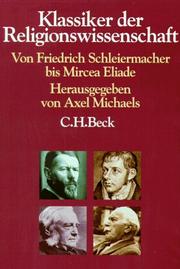
ISBN: 3406428134 Year: 1997 Publisher: München Beck
Abstract | Keywords | Export | Availability | Bookmark
 Loading...
Loading...Choose an application
- Reference Manager
- EndNote
- RefWorks (Direct export to RefWorks)
Religion historians. --- Religion --- History. --- Religion historians --- #gsdb3 --- 291 <082.2> --- 291 --- Historians of religion --- Religious historians --- Historians --- Religious history --- History --- Godsdienstwetenschap: vergelijkend--Bloemlezingen. Readers. Citaten --- Godsdienstwetenschap: vergelijkend
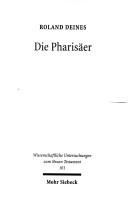
ISBN: 3161468082 9783161468087 Year: 1997 Volume: 101 Publisher: Tübingen Mohr Siebeck
Abstract | Keywords | Export | Availability | Bookmark
 Loading...
Loading...Choose an application
- Reference Manager
- EndNote
- RefWorks (Direct export to RefWorks)
Bible --- Pharisees --- Religion historians. --- Jewish historians. --- Historiography. --- 296*712 --- Jewish historians --- -Religion historians --- Historians of religion --- Religious historians --- Historians --- Jewish sects --- Historians, Jewish --- Farizeeën --- Historiography --- 296*712 Farizeeën --- Religion historians --- Pharisees - Historiography.
Book
ISSN: 24938947 ISBN: 9782406082873 9782406082880 2406082873 2406082881 Year: 2018 Volume: 13 Publisher: Paris Classiques Garnier
Abstract | Keywords | Export | Availability | Bookmark
 Loading...
Loading...Choose an application
- Reference Manager
- EndNote
- RefWorks (Direct export to RefWorks)
"Ce livre interroge les pratiques des chercheurs en sciences religieuses relevant de diverses disciplines des sciences humaines et sociales : philosophie, histoire, sociologie, science politique, anthropologie, sciences des religions et théologie. Des chercheurs, croyants et non croyants, travaillant sur le christianisme, l'islam et le judaïsme, réfléchissent à la manière dont leur foi ou leur absence de foi peut être un atout ou un obstacle pour comprendre le religieux, et quels sont les présupposés méthodologiques à mettre en oeuvre pour une approche du religieux indépendante de leurs convictions, permettant de passer d'une approche confessionnelle à une approche laïque du religieux."--Page 4 de la couverture.
Religion and sociology --- Religion historians --- Faith --- 291 <063> --- 291 <063> Godsdienstwetenschap: vergelijkend--Congressen --- 291 <063> Science et histoire comparée des religions--Congressen --- Godsdienstwetenschap: vergelijkend--Congressen --- Science et histoire comparée des religions--Congressen --- Historians of religion --- Religious historians --- Historians --- Religious life
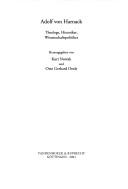
ISBN: 3525354770 9783525354773 Year: 2001 Volume: 161 Publisher: Göttingen Vandenhoeck und Ruprecht
Abstract | Keywords | Export | Availability | Bookmark
 Loading...
Loading...Choose an application
- Reference Manager
- EndNote
- RefWorks (Direct export to RefWorks)
Religion historians --- Religious historians --- -Historians of religion --- Historians --- Harnack, Adolf von --- -Harnack, Adolf von --- Historians of religion --- Harnack, Adolf von, --- Harnack, Carl Gustav Adolf von, --- Von Harnack, Adolf, --- Harnack, Carl Gustav Adolf, --- Garnak, A., --- Harnack, A. von --- Harnack, Adolfus de, --- Harnack, Karl Gustav Adolf, --- Harnack, von --- Harnack, Adolph, --- Harnack, Adolf v. --- Harnack, Adolf --- von Harnack, Adolf --- Religion historians - Germany.
Book
ISBN: 9783825353957 3825353958 Year: 2008 Volume: 43 Publisher: Heidelberg : Winter,
Abstract | Keywords | Export | Availability | Bookmark
 Loading...
Loading...Choose an application
- Reference Manager
- EndNote
- RefWorks (Direct export to RefWorks)
Religion historians --- Theologians --- Church history --- Campenhausen, Hans von, --- Christian theologians --- Scholars --- Historians of religion --- Religious historians --- Historians --- Christianity --- Ecclesiastical history --- History, Church --- History, Ecclesiastical --- History --- Campenhausen, Hans, --- Von Campenhausen, Hans, --- Religion historians - Germany --- Theologians - Germany --- Campenhausen, Hans Freiherr von --- Campenhausen, Hans von, - 1903-1989 --- Campenhausen, Hans von, - 1903-1989 - Bibliography
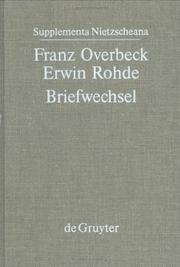
ISBN: 3110118955 3110878216 Year: 1990 Publisher: Berlin de Gruyter
Abstract | Keywords | Export | Availability | Bookmark
 Loading...
Loading...Choose an application
- Reference Manager
- EndNote
- RefWorks (Direct export to RefWorks)
Religion historians --- Theologians --- Correspondence --- 2 OVERBECK, FRANZ --- Godsdienst. Theologie--OVERBECK, FRANZ --- 2 OVERBECK, FRANZ Godsdienst. Theologie--OVERBECK, FRANZ --- Christian theologians --- Scholars --- Historians of religion --- Religious historians --- Historians --- Nietzsche, Friedrich Wilhelm, --- Overbeck, Franz, --- Rohde, Erwin, --- Overbeck, Franciscus Camillus --- Overbeck, Franz Camille --- Overbeck, Franz Camillo --- Overbeck, Franz Camillus --- Nietzsche, Friedrich --- Nietzsche, Friederich --- Correspondence. --- Nietzsche, Friedrich Wilhelm --- Overbeck, Franz
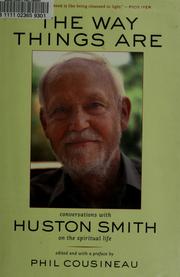
ISBN: 1282358138 9786612358135 052093881X 1597349909 0520901568 9780520901568 9780520938816 9781597349901 1417510668 9781417510665 0520238168 9780520238169 9781282358133 Year: 2003 Publisher: Berkeley University of California Press
Abstract | Keywords | Export | Availability | Bookmark
 Loading...
Loading...Choose an application
- Reference Manager
- EndNote
- RefWorks (Direct export to RefWorks)
"Where can we find what is ultimately meaningful? How can we discover what is truly worth knowing?" In one form or another Huston Smith has been posing these questions to himself-and the world-all his life. In the course of seeking answers, he has become one of the most interesting, enlightening, and celebrated voices on the subject of religion and spirituality throughout the world. The twenty-three interviews and essays in this volume, edited by cultural historian and filmmaker Phil Cousineau, offer a uniquely personal perspective on Smith's own personal journey, as well as wide-ranging reflection on the nature and importance of the religious quest. In The Way Things Are, readers will find Smith in conversation with some of the world's most influential personalities and religious leaders, from journalist Bill Moyers to religion scholar Philip Novak, and recounting his personal experiences with such luminaries as Joseph Campbell, Aldous Huxley, Timothy Leary, Daisetz Suzuki, Ram Dass, and the Dalai Lama. Throughout these engaging exchanges Smith speaks with passion and humor of his upbringing as the son of missionary parents in China, of the inspiring and colorful individuals he has known, and of his impressions of the different religious and philosophical traditions he has encountered. A fascinating view of the state of world religion and religious leadership over the past fifty years, the book also looks to the future with a final interview on the vital importance of the transcendent message of religion for the post-9/11 world. Readers will find The Way Things Are to be Huston Smith's most and accessible book to date.
Religion historians --- Religion. --- Spiritual life. --- Religion and science. --- Christianity and science --- Geology --- Geology and religion --- Science --- Science and religion --- Life, Spiritual --- Religious life --- Spirituality --- Religion, Primitive --- Atheism --- Irreligion --- Religions --- Theology --- Historians of religion --- Religious historians --- Historians --- Religious aspects --- Smith, Huston --- Ismīt, Hūstūn
Book
ISBN: 1282732536 9786612732539 0520947509 9780520947504 9780520266612 0520266617 9780520266629 0520266625 9781282732537 6612732539 Year: 2010 Publisher: Berkeley University of California Press
Abstract | Keywords | Export | Availability | Bookmark
 Loading...
Loading...Choose an application
- Reference Manager
- EndNote
- RefWorks (Direct export to RefWorks)
With its remarkable ability to adapt to many different cultures, Pentecostalism has become the world's fastest growing religious movement. More than five hundred million adherents worldwide have reshaped Christianity itself. Yet some fundamental questions in the study of global Pentecostalism, and even in what we call "Pentecostalism," remain largely unaddressed. Bringing together leading scholars in the social sciences, history, and theology, this unique volume explores these questions for this rapidly growing, multidisciplinary field of study. A valuable resource for anyone studying new forms of Christianity, it offers insights and guidance on both theoretical and methodological issues. The first section of the book examines such topics as definitions, essentialism, postcolonialism, gender, conversion, and globalization. The second section features contributions from those working in psychology, anthropology, sociology, and history. The third section traces the boundaries of theology from the perspectives of pneumatology, ecumenical studies, inter-religious relations, and empirical theology.
Pentecostalism --- Christianity --- anthropologists. --- christianity. --- ecumenical studies. --- empirical theology. --- essentialism. --- forms of christianity. --- global religion. --- methodology. --- multidisciplinary. --- pentecostalism. --- pneumatology. --- postcolonialism. --- psychology. --- religion and culture. --- religious anthropology. --- religious historians. --- religious history. --- religious movements. --- religious scholars. --- religious studies. --- religious theory. --- social sciences. --- sociologists. --- sociology. --- theology. --- world cultures.
| Listing 1 - 10 of 26 | << page >> |
Sort by
|

 Search
Search Feedback
Feedback About UniCat
About UniCat  Help
Help News
News